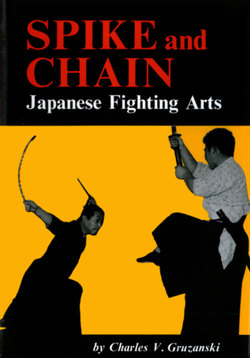Читать книгу Spike & Chain - Charles V. Gruzanski - Страница 13
На сайте Литреса книга снята с продажи.
ОглавлениеPART I
THE SECRETS OF
MASAKI-RYU
1. The manrikigusari used against the samurai sword
History of
the Manrikigusari
and Masaki-ryu
The Beginning
According to the written records of Masaki-ryu, the founder of the manrikigusari and the person chiefly responsible for its development is Dannoshin Toshimitsu Masaki—one of the most famous and skillful swordsmen of his day.
While assigned as Head Sentry for the main gate of Edo (Tokyo) Castle, it was the responsibility of Masaki and his disciples to guard against the intrusion of bandits, hoodlums, or otherwise insane persons. It was at that time that Masaki became aware and gravely concerned that should an attempt be made to breach the gate, it would certainly result in the heavy flow of blood.
Masaki's convictions dictated that such bloody battles should not take place before such a famous and important gate. He felt that a sword should never be unsheathed at such a sacred place nor should it be soiled with blood, yet the castle gate must be defended at all costs. For some time to follow, Masaki gave considerable thought to what type of weapon would be most appropriate. For reasons known only to himself, he decided that the use of the chain in some form would be most suitable for defending not only against unarmed enemies, but those armed with sticks, swords, and other types of weapons. As a result he constructed many kinds of chain weapons with iron weights attached to them—this was the birth of the manrikigusari. (These events are alleged to have occurred about two hundred years ago.)
Development of the Art
Masaki then taught the techniques of the chain to his disciples and students of the sword, and founded the Masaki-Ryu (or Masaki School). Masaki named his weapon "Manrikigusari" (manriki meaning "10,000-power" and gusari, "chain") because he felt it contained the power and ingenuity of 10,000 persons.
In the time that followed, it was not long before the manrikigusari became famous throughout Japan. People came from all corners of Japan to secure the manrikigusari and to learn its techniques and secrets. Before Masaki presented the manrikigusari to anyone or before he taught its techniques, he always instructed the receiver that the manrikigusari was not meant for unnecessary fighting and that it should be used only for right. Should it be used for wrongdoing, Masaki warned that that person would destroy himself physically and spiritually. Upon presenting the manrikigusari, Masaki is said to have bowed and with a prayer sought to inject a good spirit in it before presenting it to a patron.
The art of manrikigusari was adopted at the Ogaki Samurai Headquarters (Ogaki City, Gifu Prefecture) soon after. At that time an ancestor of Yumio Nawa (author of Jutte Hojo-No Kenkyu cited in the Acknowledgment) was Superintendent and Administer of Justice for Samurai. The art then descended to him from his grandfather.
For many years the manrikigusari was taught in the Ogaki High School as a part of its regular curriculum just as judo, kendo, and other martial arts are taught in schools throughout Japan today. But, because of its misuse by some of the students at that time, the course was discontinued. Today at Ogaki Castle there are approximately 15 manrikigusari displayed with a complete history, which is all that remains of this dying and almost extinct art.
2. Master Yumio Nawa
Other Schools of the Manrikigusari
